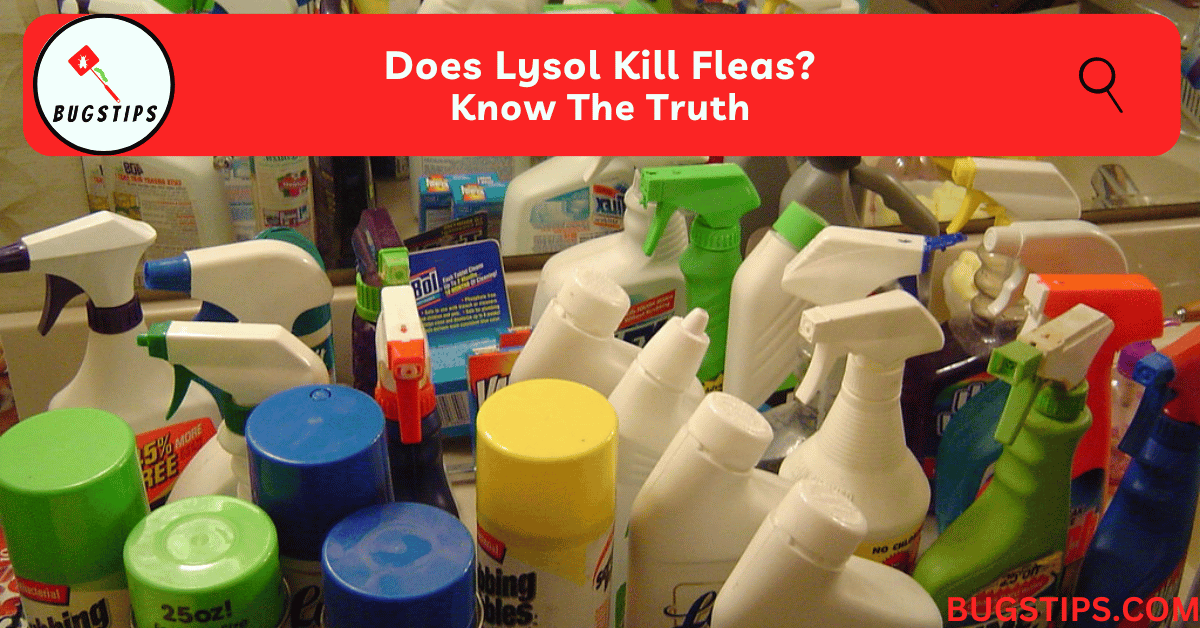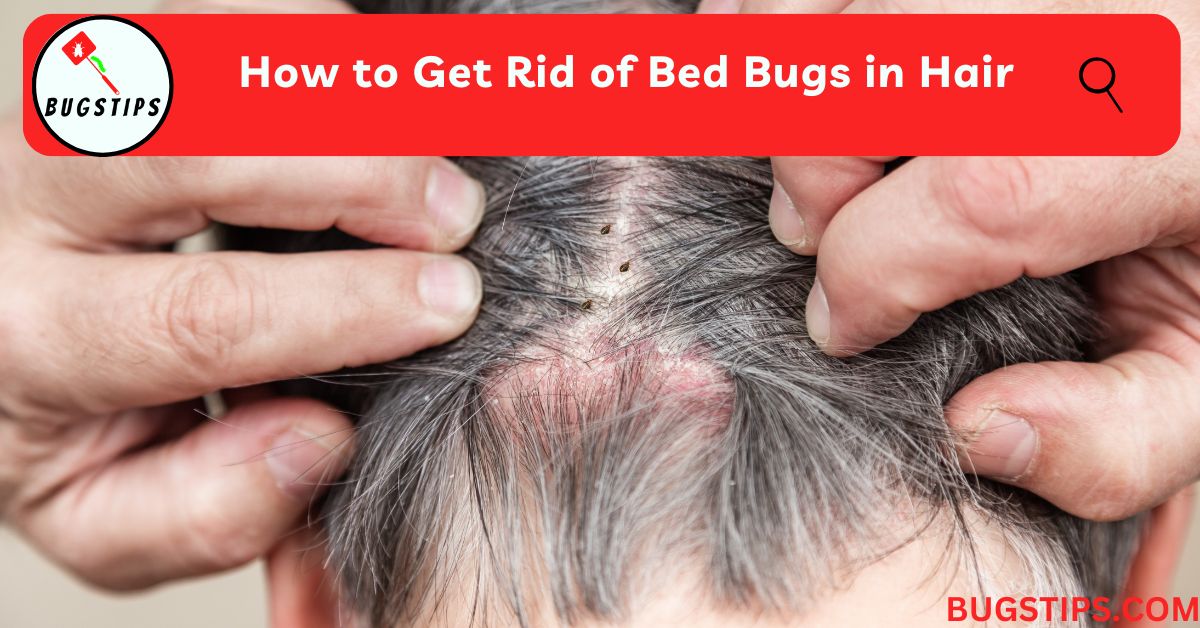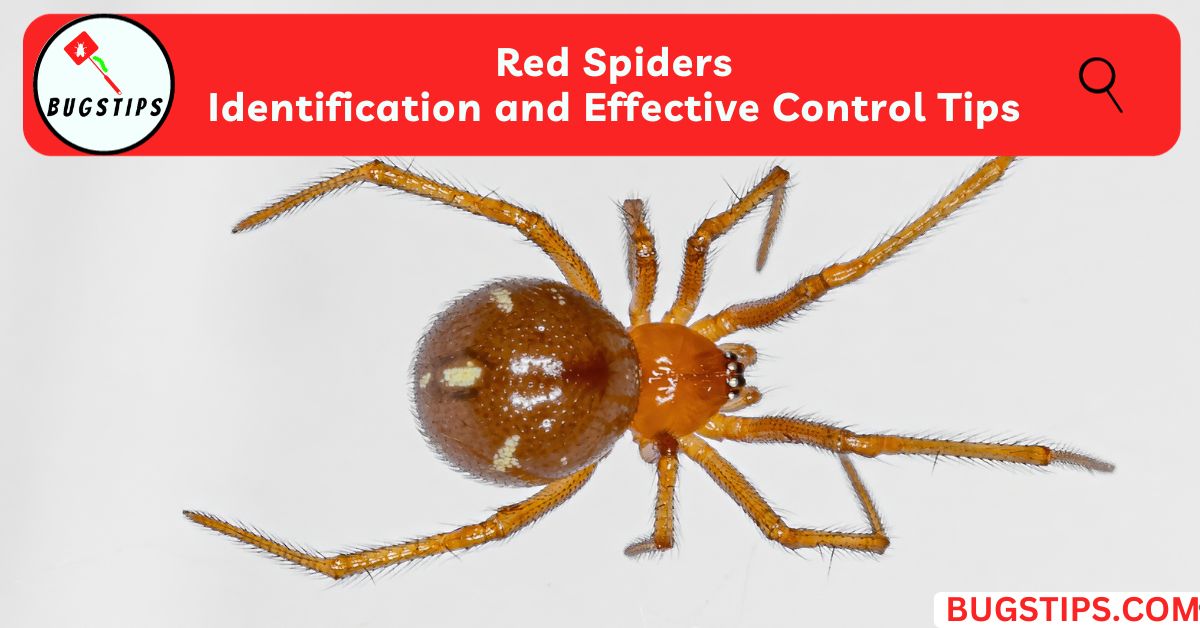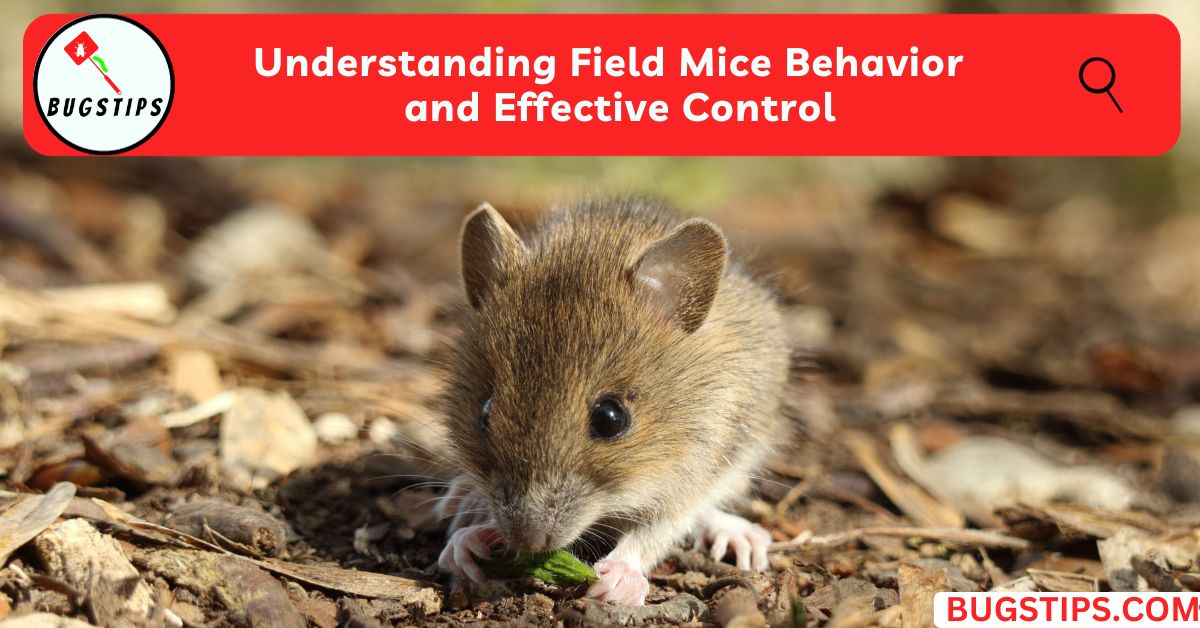This post may contain affiliate links which means as an Amazon Associate, this site may earn a small commission on qualified purchases made through links at no extra cost to you. Learn more on Affiliate Disclosure
Fleas are a common nuisance for pet owners, and they can be difficult to get rid of once they infest your home. While there are many products available to kill fleas, not all of them are safe or effective.
One product that some people turn to is Lysol, a popular disinfectant spray. But does Lysol kill fleas?
In this article, we’ll explore the effectiveness of Lysol in killing fleas and flea eggs, as well as how it works on these pests.
We’ll also provide a step-by-step guide on how to use Lysol to kill fleas and discuss the potential dangers of using Lysol around pets.
Finally, we’ll look at some alternative flea sprays to consider. So, if you’re dealing with a flea infestation and wondering if Lysol is the answer, keep reading to find out.
Does Lysol Kill Fleas?
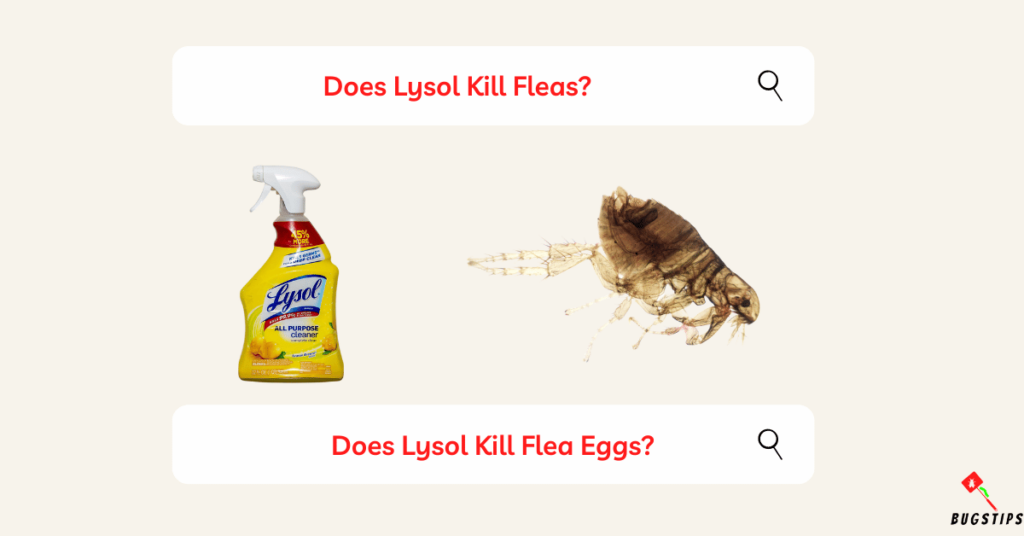
Lysol is primarily designed as a surface disinfectant and is not specifically formulated to target and kill insects like fleas. While it may have some germ-killing properties, its efficacy in eliminating fleas is limited.
Fleas have a complex life cycle, including four stages: egg, larva, pupa, and adult. Killing both adult fleas and their eggs is crucial for effective flea control.
Does Lysol Kill Flea Eggs?
Flea eggs are a significant part of the flea life cycle and can contribute to reinfestations if left unchecked. Unfortunately, Lysol is not known for its effectiveness in killing flea eggs.
Flea eggs are tiny and often hidden in various areas of your home, such as carpets, bedding, and upholstery. Lysol, being primarily a surface disinfectant, may not penetrate these areas effectively to reach and eliminate the hidden eggs.
To effectively eliminate flea eggs, it is important to adopt a comprehensive approach to flea control.
This includes treating your pets with appropriate flea control products, such as topical treatments or oral medications recommended by your veterinarian.
Additionally, thorough cleaning and vacuuming of your home, especially in areas where your pets spend time, can help remove flea eggs and prevent future infestations.
Related Article – Does Lysol Kill Ants? Find Out the Truth
How Does Lysol Work on Fleas?
Lysol is a disinfectant spray that contains active ingredients such as ethanol and alkyl dimethyl benzyl ammonium chloride.
These ingredients work by disrupting the cell membranes of bacteria and viruses, ultimately killing them. However, when it comes to fleas, Lysol’s mode of action is slightly different.
Lysol does not directly target fleas but rather works to dehydrate and suffocate them. When sprayed directly on fleas, Lysol can cause them to lose their protective outer coating, which leads to dehydration and death.
Additionally, the chemicals in Lysol can clog the flea’s respiratory system, further suffocating them.
It’s important to note that Lysol is not specifically designed for use on fleas, and its effectiveness can vary depending on the flea species and life stage.
Adult fleas may be more susceptible to Lysol than eggs or larvae, which have protective coatings that make them more resistant to dehydration.
While Lysol can be effective in killing fleas, it's not the most efficient or targeted method of flea control.
You May Also Like – Do Fleas Have Wings? Truthful Guide
How to Use Lysol to Kill Fleas
As we explained above, Lysol is not a product specifically designed for flea control, and it may not be as effective as products specifically made for that purpose.
However, if you want to use Lysol to kill fleas, here are some steps you can follow:
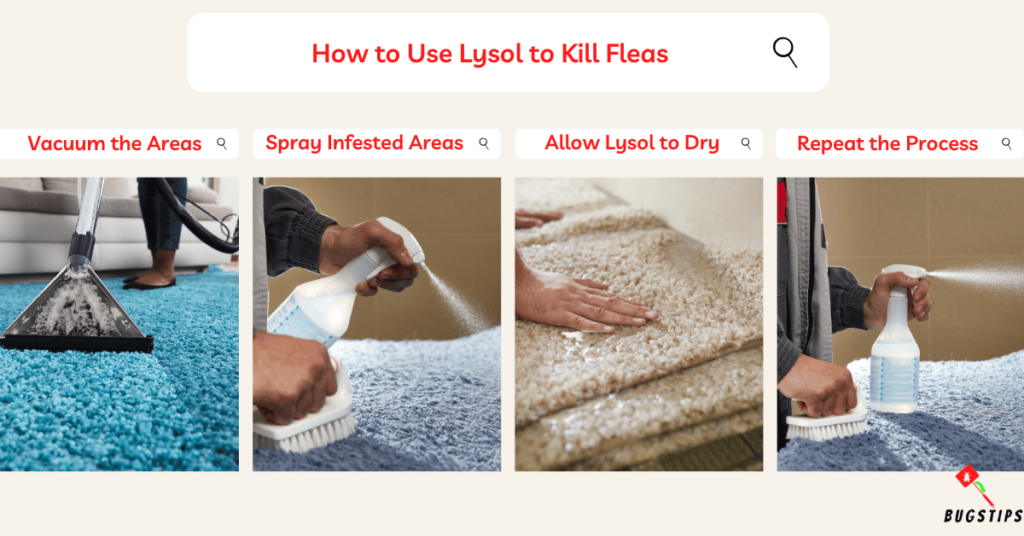
- Isolate Infested Items
- Identify the areas or items that are infested with fleas.
- This could include pet bedding, carpets, rugs, or upholstered furniture.
- Vacuum the Areas
- Vacuuming the areas where fleas are present can help to remove adult fleas, larvae, and eggs.
- This can also help to create a better environment for Lysol to work by removing any debris that may interfere with its effectiveness.
- Choose Appropriate Lysol Product
- Select a Lysol product that is suitable for the surface you will be treating.
- Lysol offers a range of disinfectant sprays and cleaners for different surfaces, such as floors, countertops, and upholstery.
- Spray Infested Areas
- Once you have identified the areas where fleas are present and vacuumed them, you can spray Lysol directly on these areas.
- Be sure to follow the instructions on the label, and avoid spraying Lysol on areas where your pet may come into direct contact with it.
- Allow Lysol to Dry
- After spraying Lysol on the areas, allow it to dry completely before allowing your pets or family members to come into contact with the treated areas.
- This can take anywhere from a few hours to a few days, depending on the humidity and temperature.
- Repeat the Process
- Fleas can lay up to 50 eggs per day, so it’s important to repeat the process of vacuuming and spraying Lysol every few days until the infestation is under control.
While using Lysol as a temporary measure might provide some relief, it is important to implement a comprehensive flea control plan to tackle the root cause of the infestation and prevent future occurrences.
You May Also Like – What Do Fleas Look Like to the Human Eye?
Things to Watch Out for When Using Lysol
Using Lysol for flea control requires caution and attention to safety. Here are some tips for using Lysol safely and effectively:
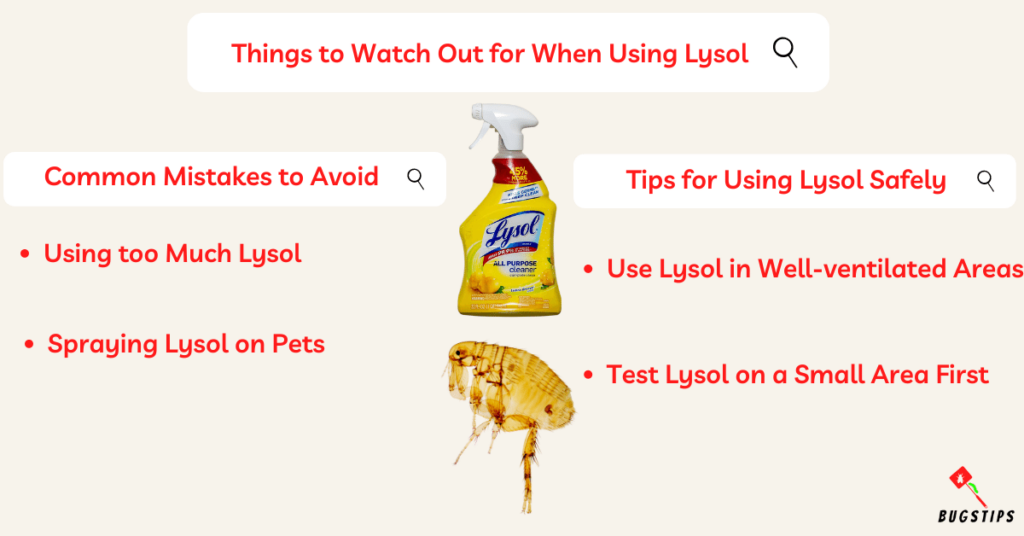
Common Mistakes to Avoid
- Using too Much Lysol
- Using too much Lysol can be toxic to pets and humans, and can also damage surfaces.
- Be sure to follow the instructions on the label and use Lysol sparingly.
- Spraying Lysol on Pets
- Lysol is not safe to use directly on pets and can be toxic if ingested.
- Avoid spraying Lysol on your pets or any areas where they may come into direct contact with it.
Tips for Using Lysol Safely and Effectively
- Use Lysol in Well-ventilated Areas
- When using Lysol, be sure to do so in a well-ventilated area to avoid breathing in the chemicals.
- Keep Pets and Children Away from Treated Areas
- After spraying Lysol, be sure to keep pets and children away from the treated areas until they are completely dry.
- Test Lysol on a Small Area First
- Before using Lysol on a large area, test it on a small, inconspicuous area first to ensure that it doesn’t damage the surface.
Lysol can be dangerous to pets if ingested or inhaled. If your pet comes into contact with Lysol, it's important to monitor them for signs of toxicity, which can include vomiting, diarrhea, difficulty breathing, and seizures. If you suspect that your pet has ingested Lysol or is showing signs of toxicity, contact your veterinarian immediately.
Alternatives to Lysol: Best Sprays to Kill Fleas
While Lysol may not be the most effective option for killing fleas, there are several alternative flea sprays available that are specifically formulated to target and eliminate these pests.
Here are some of the best flea sprays that can help you effectively combat flea infestations:
Wondercide – Flea and Tick Spray
Wondercide offers a range of flea and tick sprays that are made with natural ingredients, including essential oils like cedarwood and lemongrass.
These sprays can be used on pets, bedding, furniture, and other surfaces to eliminate fleas and prevent reinfestations.
Wondercide products are non-toxic and safe for both humans and pets.
Adams Flea & Tick Home Spray
Adams Flea & Tick Home Spray is specifically designed for indoor use to kill fleas, ticks, and their eggs.
It provides long-lasting protection and can be applied to carpets, upholstery, bedding, and other surfaces where fleas may be hiding.
This spray contains an insect growth regulator (IGR) that helps disrupt the flea life cycle, preventing the development of new fleas.
BugPursuit 24oz Flea & Tick Spray
BugPursuit Flea & Tick Spray is a powerful option for eliminating fleas and ticks from your home.
It contains active ingredients that target adult fleas, larvae, and eggs, effectively breaking the flea life cycle.
This spray can be used on carpets, furniture, pet bedding, and other infested areas.
Vet’s Best Flea and Tick Yard & Kennel Spray
Vet’s Best Flea and Tick Yard & Kennel Spray is specifically designed to target fleas and ticks in outdoor areas such as yards and kennels.
It effectively kills and repels pests, providing a protective barrier for your outdoor spaces. This spray is safe for use around children and pets when used as directed.
Black Flag 11093 B00PVN1ST8 Extreme Flea Killer
Black Flag Extreme Flea Killer is a powerful spray that targets fleas and ticks on contact. It can be used on carpets, upholstery, pet bedding, and other surfaces.
This spray provides long-lasting protection and helps eliminate flea infestations.
BugMD Flea and Tick Concentrate
BugMD Flea and Tick Concentrate is a concentrated formula that can be mixed with water and applied using a sprayer.
It is designed to kill fleas, ticks, and other pests in outdoor areas such as yards and gardens. This concentrate offers effective and long-lasting control of fleas and ticks.
In addition to using flea sprays, it's important to have a complete flea control plan. This can include regularly grooming your pets, vacuuming your home, washing bedding in hot water, and using flea control products recommended by your veterinarian. Combining these measures with the use of flea sprays can help to effectively control and prevent flea infestations.
You May Also Like – 10 Long Skinny Black Bugs in House | Effective Guide
Final Thoughts
To sum up, Lysol can kill fleas, but it’s not the most effective method of flea control. To control and prevent fleas, it’s recommended to groom your pets regularly, vacuum your home, wash bedding in hot water, and use veterinarian-recommended flea control products.
These products are specifically designed for flea control and can be more effective than using Lysol alone. If you do use Lysol, be sure to use it safely and in combination with these other flea control measures.
For severe flea infestations, it’s best to seek help from a professional exterminator who can provide targeted and effective flea control measures.
By following these recommendations and combining different flea control measures, you can effectively control and prevent flea infestations in your home and on your pets.
FAQs
Does Lysol kill fleas?
Lysol is not specifically designed for killing fleas and may not be effective in eradicating flea infestations. It is recommended to use products specifically formulated for flea control on cats.
Does Lysol kill flea eggs?
Lysol is not proven to kill flea eggs. It may have limited effectiveness in killing adult fleas but may not target the eggs.
Can I spray Lysol on the dog bed?
It is generally not recommended to spray Lysol directly on your dog’s bed. Lysol contains chemicals that may be harmful to pets if ingested or inhaled. It is advisable to use pet-safe disinfectants or products recommended by veterinarians for cleaning your dog’s bed.
Can Lysol be used to treat flea-infested carpets?
While Lysol may have some limited effectiveness in killing adult fleas, it is not the most reliable option for treating flea-infested carpets.
What can I spray on furniture to kill fleas?
you can use flea sprays or upholstery sprays that are specifically formulated for flea control. These products contain ingredients that can target fleas and their eggs without causing damage to your furniture.
What are some effective alternatives to Lysol for flea control?
There are several effective alternatives to Lysol for flea control. Some popular options include flea sprays that contain natural ingredients like cedar oil or essential oils, as well as products with insect growth regulators (IGRs) that disrupt the flea life cycle.
Resources – (for further reading)
Lysol – Lysol Disinfectant Spray
The University of Kentucky – Flea Control and Prevention | Entomology

